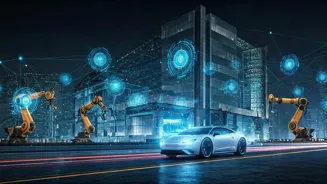AI's Job Revolution
The current technological upswing, powered by Artificial Intelligence, is poised to dramatically alter employment patterns in India. Experts predict that
by 2030, the impact of AI could be substantial, reshaping the job market in unprecedented ways. The automation that AI enables could potentially lead to a decline in roles that involve routine tasks, data entry, or structured processes. Sectors such as manufacturing, customer service, and even parts of the financial sector are likely to see significant changes. While there is potential for AI to create new job categories, the transition may require Indian workers to possess updated skills and adapt to the changing demands of the workforce. The speed and scale of this shift calls for proactive strategies from individuals, businesses, and the government to ensure smooth adaptation and minimize disruption in the Indian economy. The need to anticipate the types of jobs that will be most in demand will become increasingly important.
Jobs Most Vulnerable
Certain job types in India are predicted to face a higher risk of automation. Tasks that involve repetitive actions and can be easily programmed are most at risk. Roles in manufacturing, which often involve assembly line work and routine quality checks, may see increased automation. Data entry and processing jobs, commonly outsourced to India, are also expected to be vulnerable as AI can streamline and automate these processes. Moreover, customer service roles, previously reliant on human interactions, are also changing, as AI-powered chatbots and virtual assistants become increasingly prevalent. This shift could affect many customer-facing jobs. Roles in transportation, such as delivery drivers and taxi operators, may also see disruption due to the rise of self-driving vehicles. Consequently, a proactive approach to retraining and skill enhancement is crucial. Investing in education programs that focus on areas less prone to automation, such as complex problem-solving, critical thinking, and creativity, will be important. This can help to prepare the Indian workforce for the upcoming challenges and changes.
Thriving In The Future
As AI advances, several job categories in India are likely to remain crucial or even grow. Roles that require complex problem-solving, innovative thinking, and emotional intelligence will remain in demand. Positions such as data scientists, AI specialists, and software developers will be highly sought after as they design, implement, and manage these technologies. In addition, creative fields, including content creation, design, and marketing, which demand human creativity and nuanced understanding, are expected to stay relevant. The healthcare sector, requiring human interaction, empathy, and personalized care, is also likely to see continued demand for doctors, nurses, and therapists. Moreover, jobs involved in the education sector, focused on facilitating learning and development through human-to-human interaction, will continue to be essential. Adapting to this new landscape requires a focus on developing skills that complement AI and automation, such as critical thinking, complex problem-solving, and creativity, and fostering a mindset open to lifelong learning.
Preparing For Change
To thrive in an AI-driven work environment, India must adopt multiple strategies. Firstly, investing in education and skill development is critical. The government should prioritize STEM education, while also promoting digital literacy initiatives across the country. Secondly, it's vital to foster an environment that encourages innovation and entrepreneurship. Policies should support startups and small businesses. Thirdly, collaboration between the government, industry, and educational institutions is crucial for designing relevant training programs, curricula, and internships. Such cooperation can help to create a skilled workforce that is ready to meet the new job market demands. Furthermore, the implementation of effective social safety nets, including unemployment benefits and retraining programs, is essential to mitigate the negative impacts of job displacement caused by automation. This will ensure that the workforce can transition smoothly to new roles. Finally, fostering a culture of continuous learning and adaptability will empower individuals to navigate career transitions successfully. By embracing these approaches, India can equip itself to tackle the challenges and capitalize on the opportunities presented by the rise of AI.



















